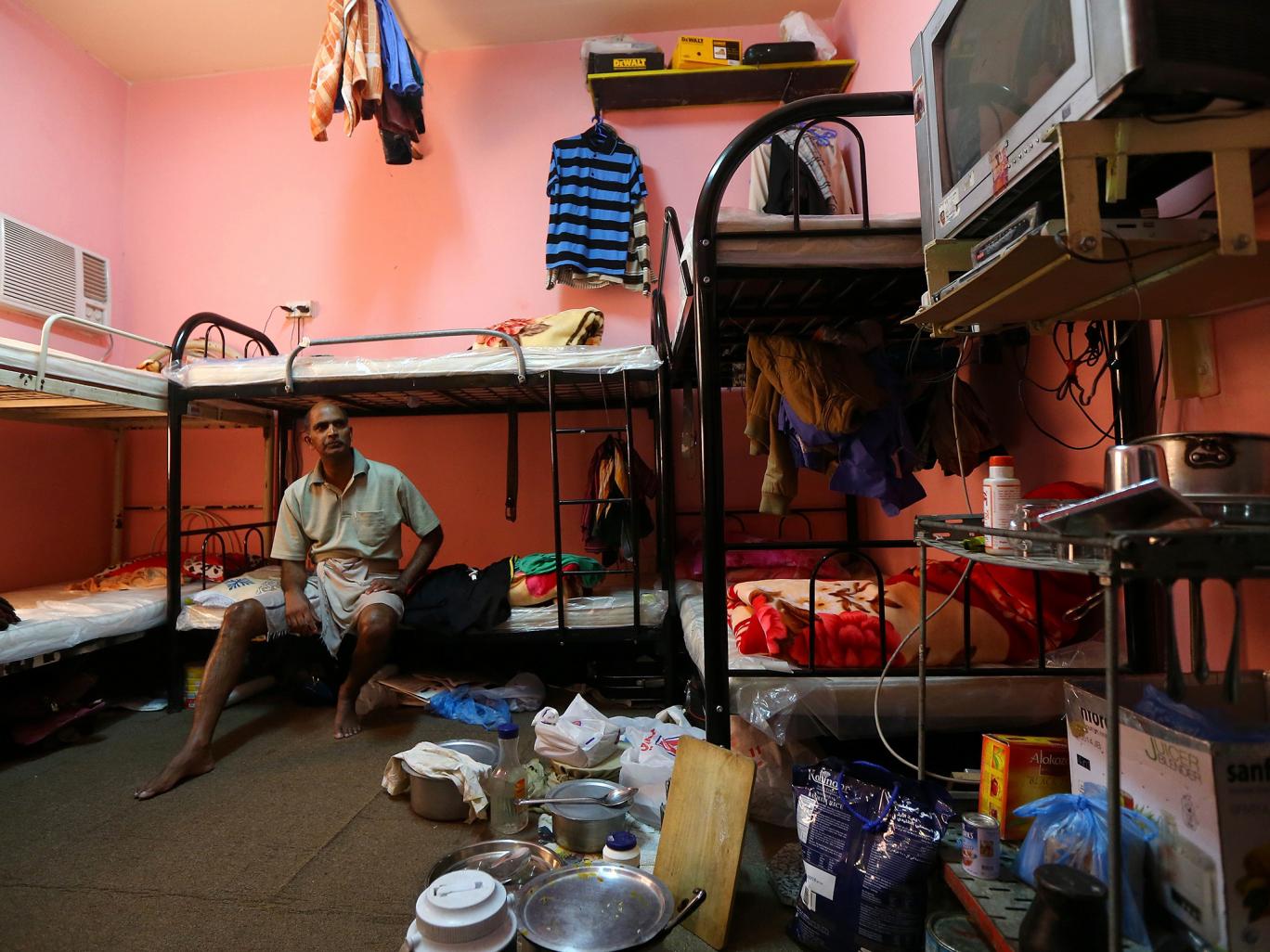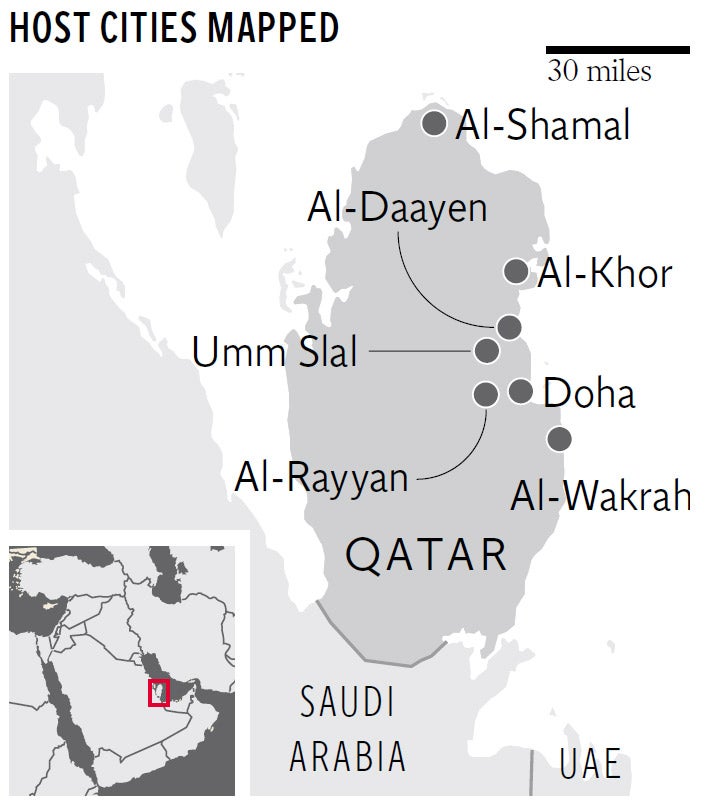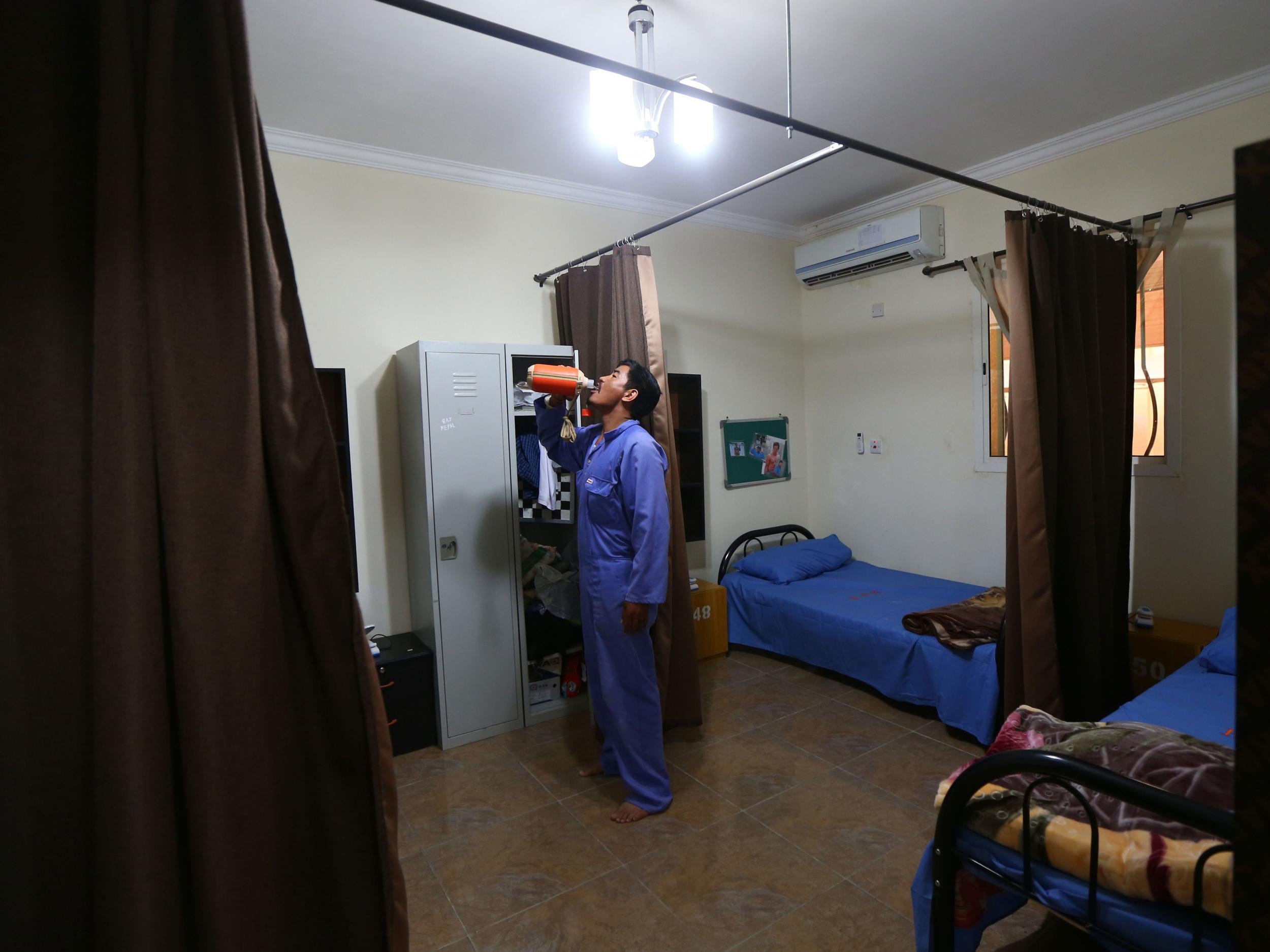We have been anaesthetised to the depressing nature of news coming out of the Middle East, but we can’t be allowed to forget what is happening in Qatar
Your name is Sumon, and you live in a small village in rural Bangladesh. One day you’re visited by a casual acquaintance you’ve known since childhood, who has an opportunity. He’s recruiting for a clerical job, he knows you’ve always been bright and ambitious, and he wants you. He’ll take care of everything: paperwork, passport, medical, transport. He’ll even act as a reference if you need a bank loan. The promised salary – $400 dollars US a month – is literally more money than you’ve seen before in your life.
Of course, you’re no mug. You’ve heard the stories. But this is an old friend. Your children go to school together. He works for the local government. He wants to help. A fresh start, financial security, a better future for your family. Besides, what’s the alternative? Stay in your village and slowly get old?
So you sign. There’s a small recruitment fee to be paid, plus the cost of your orientation seminar, medical examination, insurance. You sell some land, empty your savings, lean on your extended family for support, and borrow the rest against future earnings. It’s a big, life-changing step. But with your handsome salary, you reckon you’ll be able to break even and start sending money home within a few months. You’re doing this so your children won’t have to.

Alas, when you land in Doha, the goalposts have shifted slightly. This much becomes apparent when you’re handed a helmet and a high-viz jacket and told to present yourself at a building site at 6am the following morning. You’re not working as a clerk in an office, you’re building a football stadium. They’re not quite sure who told you the $400 a month figure, but it’s actually going to be $200, less miscellaneous costs. The recruitment fee isn’t $200 as you’d agreed, but $2000, plus the cost of your flight to Qatar. Your crisp new passport is confiscated. You cannot quit your job. You cannot leave the country. And before you have even clocked in for your first shift, you owe your employer the equivalent of two years’ wages.
And so quite suddenly, you are plunged into a bewildering world of alienation and exploitation, long hours and back-breaking toil in baking heat. Twelve hours a day, six days a week. At night, you sleep on a filthy bunk bed. At least your wages are getting paid on time. You’re one of the lucky ones. Talking to other migrant workers in one of the many makeshift camps dotted around the outskirts of Doha, you find others who are having money withheld for two, three, sometimes even six months.
It is a world of instability and euphemism. Co-workers keel over, and within minutes they’ve been spirited away under a thick blanket, declared “absent” and never seen again. If you try and visit a shopping mall on a rare day off, a stern-looking security guard will tell you this is a “family zone” and escort you off the premises. Really, you’re not an employee at all, but an indentured labourer. And really, you’re not building a football stadium. You’re building a mausoleum.
No doubt you’re aware, whether through The Independent’s campaign against modern slavery or through the drip-drip of your daily news feed, that the 2022 World Cup is a Bad Thing. The deluge of negative press that has engulfed Qatar’s winning bid for the last seven years has ensured that much. Yet at the same time, the sheer relentlessness of depressing news coming out of the region has anaesthetised us to it. After all, there is plenty of competition for people’s outrage these days. The upshot is that however bad you think the 2022 World Cup is, chances are it’s even worse than that.
The lack of tangible, recognisable human faces to put on the story is another factor. That’s why I made Sumon up. He doesn’t exist. His story never happened. But of course, he does, and it did. Sumon exists around 2.3 million times over. His story happened yesterday, and it will happen again today, and again tomorrow.

Last week, the charity Human Rights Watch issued its latest report into the conditions of migrant workers in Qatar. It found that regulations meant to protect workers from heat and humidity were still woefully inadequate. It found that hundreds of migrant workers were dropping dead on construction projects every year, but it’s hard to be sure exactly how many and how they’re dying, because Qatar won’t tell us, or even carry out post-mortems. The few deaths that are officially accounted for are generally given conveniently vague descriptions like “unknown causes”, “natural causes” or “cardiac arrest”, giving the impression that they are simply part of the rich circle of life. They just died, OK? These things happen.
HRW has been banging on about this sort of stuff for years, patiently pointing out the ways the country tries to resist external oversight, promises reforms that are either not enforced or only apply to the tiny fraction of the workforce actually building World Cup stadiums. Yet its latest report raised barely a murmur. Another story about Qatar? Mmm, yes, how ghastly. And so over the years, Qatar 2022 has slipped down the emotional radar, swallowed up by newer, sexier Bad Things.

One of the reasons you don’t see or hear from the victims of Qatar’s cruelty is that it’s almost impossible to get to them. In March last year, a UN delegation visited Qatar to check on progress, investigate working conditions and generally have a little mosey around. They spoke to a Nepalese construction worker, who had the temerity to answer their questions truthfully. The worker was summarily fired, and ordered to get on the first plane back to Nepal. Along the way, someone realised that because the worker no longer had a work sponsor, he could be thrown in jail. So he was thrown in jail.
There is a temptation to attribute all this to simple, rapacious, market capitalism. After all, rich people have been exploiting poor people since the dawn of time. Yet to describe the Qatar World Cup as simply a labour rights scandal would be to let it grotesquely off the hook. To understand why, you need to understand the demographics of Qatar.
Fifty years ago, you could have quite comfortably seated the entire country in one of their swanky new World Cup stadiums. Now, Qatar’s population is 2.6 million, of whom nearly 90 per cent are migrant workers. For native Qataris, in control and yet massively outnumbered, the primal and perpetual fear is that the foreign-born population – overwhelming working-age and male – will somehow unite, coalesce, perhaps even mobilise against them. It is why the idea of any form of organised labour is met with horror from the local population, who see this as a national security issue. And it explains the systematic and quite overt discrimination that migrant workers face, even when outside the workplace.
Certain public spaces in Doha – markets, shopping malls, town squares – have been designated as “family zones”: in effect, for locals and Westerners only. Armed security guards patrol these areas, escorting those of south Asian appearance firmly towards the exits. Migrants are even banned from living in certain areas. A few years ago, the country’s Central Municipal Council proposed designating Friday – most workers’ only day off – a “family day”, during which non-Qataris would be banned from entering the country’s many popular shopping malls.

This is segregation by stealth.
And in five years’ time, this is the country that will throw open its arms and host the biggest footballing party on Earth. The 2022 World Cup is a tournament being built on a graveyard of human bodies, to prop up a society founded upon the most basic type of racism. Qatar’s gamble is that the wider world, distantly absorbed in its own problems, won’t care enough to make it stop. It’s a gamble they’re winning.
So, here comes the big question. What can you – the erudite, empathetic, informed reader of The Independent, scrolling through this article over your lunch break through a flurry of push notifications – do about it? One thing we probably can’t do, unfortunately, is take the World Cup away. If Qatar was going to be stripped of the tournament, it would have happened in the last seven years, not the next five. And it is telling that much of the Western media continues to train its outrage on the Qatari bid itself, and the accusations of vote-buying in the Fifa executive committee. Exploit all the migrant labour you want, guys, but at least be above board about it, yeah?
What you can do is follow the money. Once Fifa have taken their cut, the revenues generated by a World Cup flow back into the game via its member associations. That means the FA – our Football Association – stands to financially benefit from a Qatar World Cup, assuming England qualify. That’s money going into your local FA, your local club, your local pitches. If that makes you feel uneasy, why not tell them about it?
Qatar’s stadium plans for 2022 World Cup




The other thing you can do is see. Qatari soft power is everywhere you look, especially if you live in a big city like London or New York. If you shop at Sainsbury’s, fly British Airways or hold an account at Barclays Bank, you are indirectly funding the Qatari state. And if you watch the Premier League or Champions League, you are watching a game fattened and buttressed by Qatari money, whether it is the direct product of Paris Saint-Germain’s investment in players like Neymar, or simply a market grotesquely inflated by their transfer fees.
Which is not to guilt-trip anybody. We all have to live our lives: I’ll still shop at Sainsbury’s, it’s the closest supermarket to the Tube station. I’ll still watch PSG, because how could you love football and not? But the first step to solving any problem is to see it, recognise it, understand how it fits into the world we inhabit. And so perhaps the next time you see Kylian Mbappe bearing down on goal, or glimpse the Shard through your window, perhaps you’ll also see Sumon, stepping on a plane to begin what he comically imagines will be a better life.


